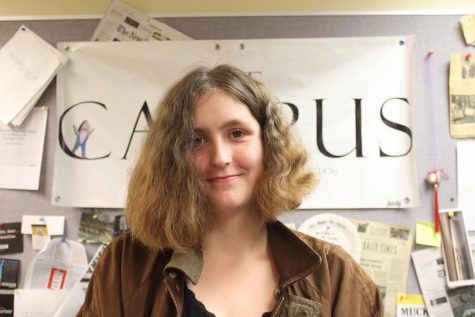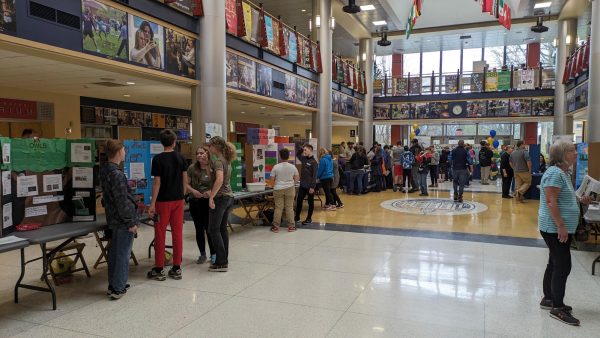Food Recovery Network opens discussion on food insecurity on campus
Food Recovery Network held an introductory club meeting for prospective new volunteers on Monday, Jan. 30, in room 301/302 of the Henderson Campus Center. This semester, FRN plans to not only continue working with Brooks Dining Hall and managing food waste, but to also spread more awareness about food insecurity.
“Just coming here and seeing the community and individuals I know going through food insecurity both on and off-campus really inspired me to join just because I know how much of a real issue it is when it comes to each personal situation, but also on a broader level,” said FRN Vice President Amani Green, ’25.
The beginning of the meeting honed in on the topic of food insecurity, and the board members made mention of several ideas on how to get more food to the students who need it — namely, creating campus community fridges and conceiving data as proof that this issue is running rampant on campus. The club is already responsible for the food pantry on the third floor of the campus center.
“Food insecurity is a genuine problem on campus and in the local community,” said FRN President London Dejarnette, ’24. “Even if there isn’t an institutional acknowledgement of how bad it is, we can also vote. We want to gather 100 students that could say on record that this is an issue right now. We’re trying to figure out a way to establish data to give to the institution, because they’re not interested in establishing any programmatic changes to address hunger unless there’s data exhibiting that it’s real.”
There needs to be a system put in place to be proactive, especially knowing that the issue will continue because of the lack of administrative awareness and accountability, according to Green.
A problem exists with the disconnect between the student body’s food insecurity and the amount of food wasted in Brooks, according to FRN Volunteer Recruitment Coordinator Zoë McKen, ’25. There is a large difference between the amount of food FRN volunteers were boxing before with Parkhurst and now with Aramark, as so much food is being saved by the FRN that the industrial fridge in Schultz Hall’s basement used for storage is already full.
“Parkhurst was much less willing to share any food,” said FRN Treasurer Peter Alegre, ’23. “They said they didn’t have any waste, and they would only give us stuff on the line. But with Aramark, even just in a few weeks, it eclipses Parkhurst’s food quantities in the past. And right now, it feels like the students are being fed the same amount. It shows how huge the food vendor’s role is and how it impacts how much food is recovered.”
Among the many issues FRN wants to address is educating the campus community on the poverty levels within Meadville itself, especially now that the club has gained more traction.
“Hunger is prevalent in Meadville and Allegheny,” Alegre said. “When reviewing a senior comp from a few years back, it showed that over 20% of Meadville citizens are under the poverty line and around 50% were nutritionally deficient. I think a lot of students detach themselves from Meadville, but we still live here. Many people vote here. And I understand that a lot of people live here after graduation as Meadville residents, so these issues in Meadville do affect us, too.”
The board and volunteers are required to dedicate what time and effort they can to the cause because of how much work there is to be done. However, food recovery and community service is something the entire board is passionate about.
“I started off with a passion to actually do something and make an impact based on what I was pre-exposed to prior to coming to Allegheny and I was seeing those kinds of connections within our own community on campus,” said FRN Secretary Kaylan Parker, ’25.
The club has a deep-rooted personal commitment to the cause, as working through Bonner Service Leadership Program exposed them to the extent of food insecurity happening on and off-campus, according to Dejarnette.
“I think that if I have the means to do service work, then it’s a privilege to do service work,” Green said. “And with FRN, it’s a privilege that we have this connection to Aramark workers and the broader Meadville community that I feel like a lot of students are not exposed to due to institutional neglect. Seeing the impact that it has on the community — it’s something that’s really rewarding.”

Elanor Bonta is a first-year from Shanghai, China. She is majoring in psychology and minoring in biology.






